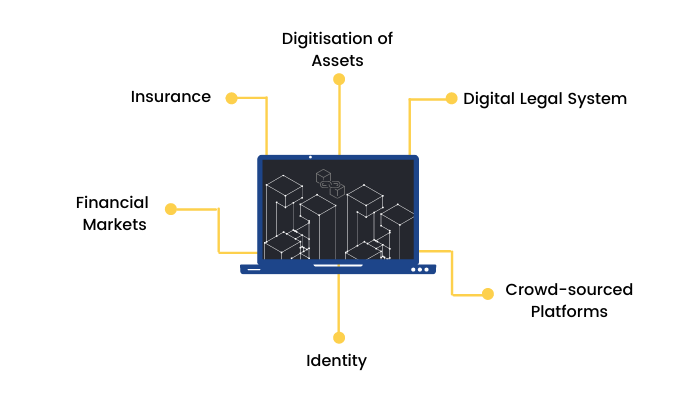Potential Applications Of Blockchain
Applications of Blockchain
Decentralisation is the core theme of blockchain and the basis of many of its applications. Since it has successfully supported Bitcoin for years (discussed later), it is ready for experimentation in various other industries and use cases, some of which are given below.

Digitisation of Assets
A company or authority or any similar entity typically centralises all asset registrations. What if they could move to blockchain to make it more transparent, efficient, faster and secure? This could apply to many areas, from housing and vehicle registration to authenticating luxury assets like paintings, diamonds with digital certificates.
Digital Legal System
Various legal documents are signed by different parties, stored in a physical or scanned format, and possibly registered with central authorities. They could potentially move to a digital format with standardised or custom contract formats and secure digital signatures embedded within the blockchain itself. Eventually, this may be used to introduce smart contracts, which can be actionable events based on multiple conditions like time, place, etc. For example, a person's will can be written in this format to allow the inheritance of his wealth only upon a certain time or event like his death.
Crowd-sourced Platforms
Many platforms like Wikipedia that are purely crowd-sourced in nature could benefit dramatically from Blockchain’s information creation and management system.
Identity
Digital ID creation for every individual, combining verification under the decentralised blockchain identity systems, can create the world's largest set of unique digital IDs. Various governments around the globe have failed to realise the potential of this use case and are yet to implement it in its entirety,
Financial Markets
Financial institutions, including banks, have inefficient processes and legacy infrastructures to manage transactions. Various post-trade transactions for payments (for example, in banks) and clearing and settlements in the securities world (stock markets) could be dramatically improved using blockchain. But due to high overheads and delays in validating various blocks before the transaction, blockchain may not be helpful in live trading processes for now. This may change as blockchain technology gets more mature, scalable and faster in the next few years.
Insurance
Blockchain can transform the way people manage identities and personal information, leading to a change in the way insurers review risk and price the premiums. Blockchain applications in insurance are likely to start with digital identity systems and the management of personal data. Smart contracts (where the outcome is pre-determined or event-based) can help end-users self administer their insurance policies.

